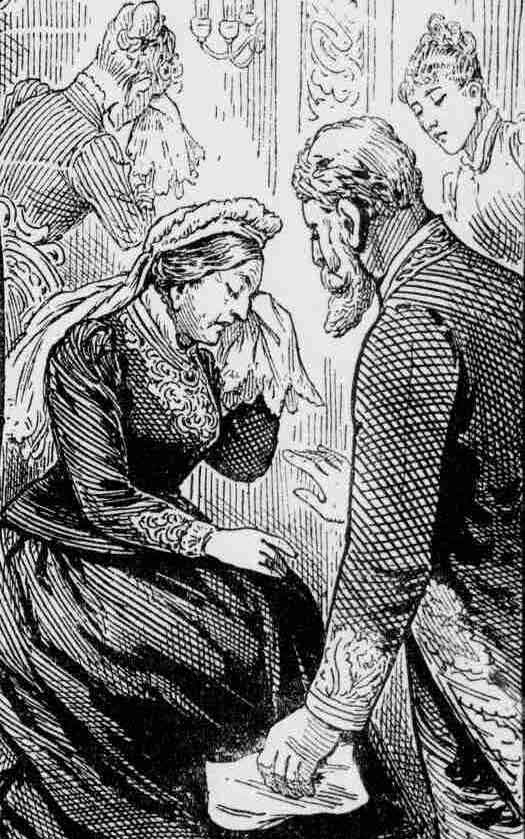The following article appeared in the Derby Daily Telegraph on Wednesday, 22nd October, 1930, upon the publication of a volume of the letters of Queen Victoria:-
QUEEN VICTORIA IN A SHERLOCK HOLMES ROLE
QUEEN ATTACKS THE POLICE
HINTS ON HUNTING THE “RIPPER”
Queen Victoria is revealed in the role of a sleuth, critical of the police and with her own ideas of the manner in which the hunt for Jack the Ripper should have been conducted the volume of her letters, edited by George Earle Buckle, published today.
The Queen was in residence at Balmoral Castle, where she was kept informed of the activities of the police, when another murder took place.
“This new more ghastly murder,” read a cypher telegram which she sent to the Marquis of Salisbury, “shows the absolute necessity for some decided action.
All these courts must be lit and our detectives improved. They are not what they should be.”

THE QUEEN’S SUGGESTIONS
“The Queen fears,” she wrote a few days later, “that the detective department is not so efficient as it might be.
No doubt the recent murders in Whitechapel were committed in circumstances which made detection very difficult; still, the Queen thinks that, in the small area where these horrible crimes have been committed, a great number of detectives might be employed, and that every possible suggestion might be carefully examined and, if practicable, followed.”
“Have the cattle boats and passenger boats been examined? Has any investigation been made as to the number of single men occupying rooms to themselves?
The murderer’s clothes must be saturated with blood and must be kept somewhere.
Is there sufficient surveillance at night?”
The effect of this caustic comment and advice is not revealed; we may be sure that Queen Victoria would ensure that it was not ignored!
HOME RULE BILL
The years 1886 – 1901, with which the present volume deals, were among the most vital of her reign.
Mr. Gladstone’s scheme for conciliating the Irish with the first Home Rule Bill alarmed her, and her thankfulness when it was defeated is expressed in her journal.
“Did not sleep well, as I felt so worried and anxious. When I got up, a telegram was brought in to me which gave the news that the Government had been defeated by a majority of thirty. Cannot help feeling relieved, and think it is for the best interests of the country…”
THE EMPEROR WILLIAM II
The Emperor William II is a prominent figure in the correspondence of 1889. A coolness had arisen between him and the Prince of Wales, and his attitude towards his mother had also aroused comment.
In 1888, there was some anxiety among persons high in office at Berlin with respect to him.
“It appears that his head is turned by his position,” the Marquis of Salisbury wrote to Queen Victoria, “… all Prince William’s impulses, however blameable or unreasonable, will henceforth be political causes of enormous potency…”
“PERFECT MADNESS”
Six months later, the Queen wrote to the Marquis of Salisbury with reference to an allegation that the Prince of Wales had not treated his nephew as Emperor, “… this is really too vulgar and too absurd, as well as untrue, almost to be believed. We have always been intimate with our grandson and nephew, and to pretend that he is to be treated in private as well as in public as ‘his Imperial Majesty’ is perfect madness! He has been treated just as we should have treated his beloved father and even grandfather, and as the Queen herself was always treated by her dear uncle King Leopold. If he has such notions he had better never come here.”
“The Queen will never swallow this affront … All this shows a very unhealthy and unnatural state of mind; and he must be made to feel that his grandmother and uncle will not stand such insolence. The Prince of Wales must not submit to such treatment.”
The Queen added that political relations should not be affected by these miserable personal quarrels, but feared that “with such a hot-headed conceited and wrong-headed young man, devoid of all feeling, this may at any moment become impossible.”
In these “Letters” we have the Queen before us to an extent that we have had scarcely any other great personage in history. The frank and full revelation of her personality has been the chief consideration.
Before us the correspondence of Royalty, statesmen, ecclesiastics and nobility unrols like a great panorama; the outstanding impression one of the continuity of the strain and the labour devolving on the great Queen.”
